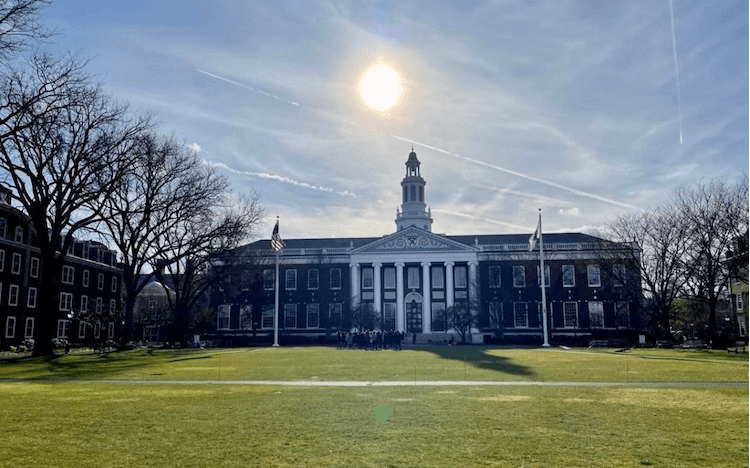However, it’s not always clear what GPA is “good enough” for a top school, or how important it is compared to other MBA entry requirements.
Here, we break down what is a good GPA for an MBA and the average GPA scores at the top 10 US business schools.
What is a good GPA for an MBA?
A good GPA for an MBA program usually ranges anywhere between 3.0 and 3.5, while the GPA scale ranges between 1.0 and 4.0. According to the National Center for Education Statistics, the average college GPA is 3.28, so this range is achievable for most students.
If you are aiming for one of the top MBA programs in the US, you may want to aim above this range. Students in these programs tend to have higher average GPA scores, which reflects the academically rigorous curriculum at the best schools. GPA is therefore important to consider when building an application to these programs.
However, there’s no need to panic if you think you have a low GPA. Many business schools like Northwestern University’s Kellogg School of Management don’t have minimum MBA GPA requirements.
GPA is also only one part of your application. Many of the schools on this list provide GPA ranges that show some students who gain admission have lower-than-average GPA scores. This shows that you can make up for a lower GPA with strengths in other areas, such as the GMAT.
Average MBA GPA scores at the top 10 US business schools
To get a sense of where you should be aiming with your GPA, it’s always wise to compare your score with the average at the schools you’re targeting.
Here are the average MBA GPA scores* at the top 10 ranked US business schools in 2024, according to the Financial Times.
10. Yale School of Management
Financial Times global rank: 15
Median undergraduate GPA: 3.64
80% GPA range: 3.30-3.91
Academic centers at Yale include the International Center for Finance, the Center for Business and the Environment, and the Center for Customer Insights, giving you plenty of opportunities to specialize.
Students on Yale's MBA partake in:
→ Yale’s Leadership Development Program, a leadership curriculum that runs throughout the entire 22-month program
→ A global studies requirement, which teaches students to think about business in a global context
→ A study trip to an overseas business capital, which exposes them to business operations and practices in different cultures
9. Duke University’s Fuqua School of Business
Financial Times global rank: 14
80% GPA range: 3.10-3.89
The MBA program at Duke University’s Fuqua School of Business is highly customizable. Students can choose from 16 different concentration tracks including Decision Sciences, Energy and Environment, FinTech, and Social Entrepreneurship.
It is even possible to receive an exemption from some core courses if you can prove your prior expertise in that area, giving you license to diversify your learning even further.
The academic rigor of the program pays off when it comes to recruiting season: a massive 87% of the Duke Fuqua MBA class receive job offers by graduation.
8. Tuck School of Business, Dartmouth College
Financial Times global rank: 12
Average undergraduate GPA: 3.49
GPA range: 2.7-4.0
Tuck School of Business prides itself on its inclusive environment; the class of 2025 has 44% women enrolled. This is higher than the average for most MBA programs, which sits at 38%. The program also boasts 32% US minority students, and 33% international students.
If enrolled in the Tuck MBA, you’ll join a global alumni network of 10,000 graduates. You’ll also enjoy a high return on investment after your studies—Tuck MBA graduates earn a median base annual salary of $175,000, with 83% receiving a sign-on bonus.
7. Harvard Business School
Financial Times global rank: 11
Average undergraduate GPA: 3.73
Harvard Business School is renowned for being one of the world’s best MBA programs, with a strong focus on management expertise, non-profit, and entrepreneurship. It is also famed for the HBS case study method of teaching, used the world over.
Although the Harvard MBA costs around $118,000 per year, you can expect a great return on your investment. The median base salary upon graduation from the HBS MBA is a huge $175,000.
Read: Is GPA Important in MBA Admissions?
6. The University of Chicago Booth School of Business
Financial Times global rank: 10
Average undergraduate GPA: 3.6
GPA range: 2.4-4.0
This 21-month program focuses on developing MBAs into resourceful leaders through hands-on learning and ample specialization opportunities. Students kick off the program with LEAD, an experiential course designed to help them identify their unique strengths as leaders.
Students can choose from 14 different concentrations and benefit from more than 70 student-led groups, including business and professional groups, personal affiliation groups, and special interest groups.
After completing their studies, more than 96% of students accept job offers within three months of graduation.
5. Cornell Johnson Graduate School of Management
Financial Times global rank: 9
Median undergraduate GPA: 3.35
One of the key takeaways from Cornell’s MBA class profile is that the school has a more holistic approach to MBA admissions than many top institutions.
At around 31%, Cornell’s MBA acceptance rate is reasonably achievable, and the 3.35 average GPA sits in a similar bracket. If you are brilliant and qualified, you need not fear the Cornell admissions team disqualifying you for a lower GPA score.
This is excellent news because Cornell has a lot to offer. The two-year MBA program provides students with immersive experiences such as faculty-led global study trips and summer internships, and 94% of students receive employment offers by graduation.
4. MIT Sloan School of Management
Financial Times global rank: 6
Median undergraduate GPA: 3.61
Nearly 87% of full-time MBA graduates at MIT are employed three months after business school, with a whopping average base salary of over $168,000. The median signing bonus for MIT MBAs is $30,000, with nearly three-quarters of grads reporting that they received one.
This is significantly higher than the average MBA starting salary, which is $115,000 according to the Graduate Management Admission Council (GMAC).
Graduating from the school places you among a number of high-profile MIT notable alumni, including Carly Fiorina, former president and CEO of Hewlett-Packard Co., and John Reed, former chairman of Citicorp.
Average GPA scores at the top 3 US business schools
Wondering what the average GPA scores are on the very top MBA programs as ranked by the Financial Times? Here's what you need to know.
3. Kellogg School of Management, Northwestern University
Financial Times global rank: 6
Average undergraduate GPA: 3.7
GPA range: 2.8-4.0
Home to notable alumni like William Sickles, team lead of Retail at Google, and Vijay Karnani, managing director at Goldman Sachs, the Kellogg MBA draws in undergrads from an array of different industry backgrounds.
The top five target industries for Kellogg MBAs are consulting, financial services, technology, consumer goods, and healthcare. Nearly nine out of ten students receive a job offer by the time they graduate from the program.
Read a breakdown of the Kellogg MBA Class Profile
2. Columbia Business School
Financial Times global rank: 3
Average undergraduate GPA: 3.5
80% GPA range: 3.2-3.9
Columbia Business School’s MBA program has concentrations in areas including Accounting, Consulting, Economics, Entrepreneurship, and Finance.
The school boasts an impressive network of 48,000 alumni and has students come from over 90 countries across the world to join its MBA class. The average MBA Salary of Columbia grads is $175,000.
Read the Columbia MBA Jobs and Salary Review
1. The Wharton School of The University of Pennsylvania
Financial Times global rank: 1
Average undergraduate GPA: 3.6
Wharton sits at the top of the Financial Times MBA ranking, and for good reason. In the class of 2023, of those seeking employment after graduation, 92.3% had accepted offers by graduation.
After completing an MBA at Wharton, the median salary of graduates is $175,000. If you’re among them you’ll also join an extensive 100,000+ alumni network, spanning 150 countries.
Read the Wharton MBA Jobs and Salary Review
*Average MBA GPA scores taken from school report data. This article was updated in April 2024.
RECAPTHA :
03
4a
a7
20









